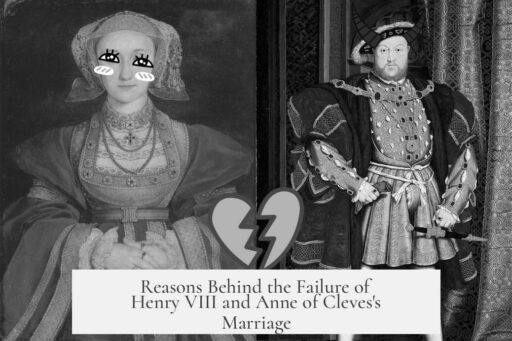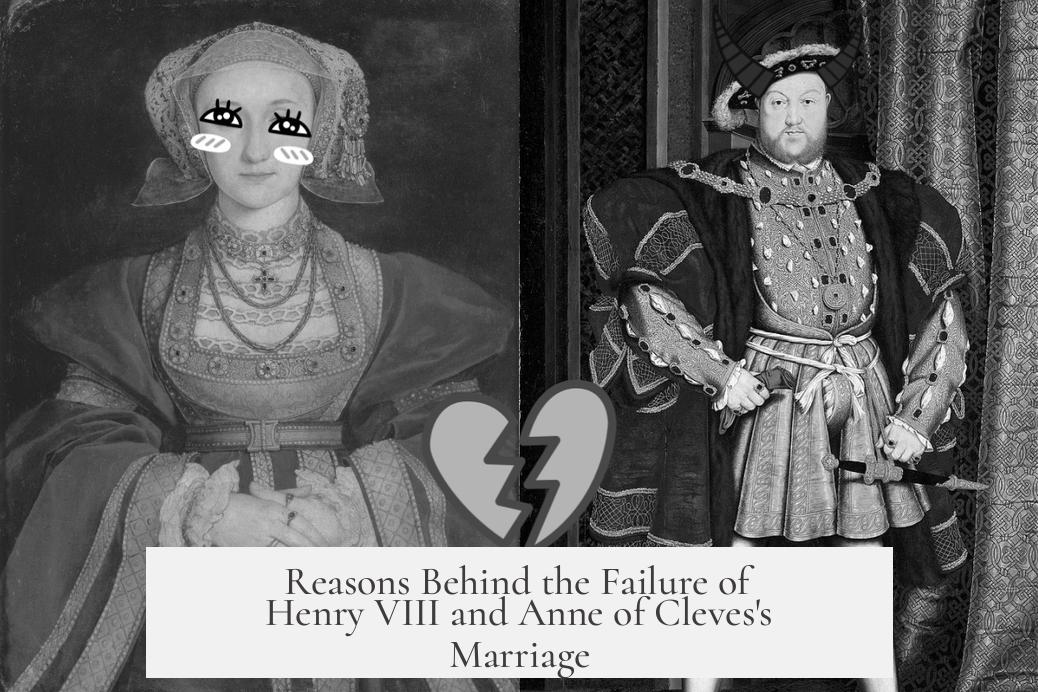Henry VIII and Anne of Cleves’s marriage fails primarily due to political motivations overriding personal attraction, compounded by Henry’s immediate dislike and refusal to consummate the union. The marriage is a prime example of Tudor-era dynastic alliances where strategic needs eclipsed individual choice and affection.
The union was arranged amid intense political tensions in 1539. Henry VIII found himself isolated after the break with the Catholic Church. His council sought allies against major European powers, particularly Charles V of the Holy Roman Empire and François I of France. Anne of Cleves was selected mainly because of her brother William V, Duke of Jülich-Cleves-Berg’s political ambitions. Negotiations, focusing strictly on alliance-building, dragged on from March until October 1539 without regard to Henry’s personal preferences.
Upon Anne’s arrival in England at Rochester Castle, Henry’s immediate reaction was negative. He famously exclaimed, “I like her not! I like her not!” His disenchantment intensified rapidly after their wedding on December 31, 1539. Within days, Henry criticized Anne’s appearance and even her smell, remarking, “She is nothing fair, and have very evil smells about her.” This harsh judgment reflects how strongly Henry rejected Anne despite the alliance’s importance.
More tellingly, Henry refused to consummate the marriage, a crucial aspect in Tudor marital legitimacy. His comment, “I have left her as good a maid as I found her,” communicated his deliberate avoidance of physical intimacy. This lack of consummation soon became the grounds for annulment.
| Key Factor | Details |
|---|---|
| Political Alliance | Anne was chosen to secure an alliance with Cleves amid European conflicts. |
| Henry’s Reaction | Immediate dislike; verbal rejection; avoidance of consummation. |
| Annulment Grounds | Non-consummation; Anne’s pre-contract to François of Lorraine. |
| Post-Annulment | Anne accepted the annulment; received wealth and favorable status. |
The marriage’s formal end came in July 1540, after which Henry rapidly pursued his fifth wife, Katherine Howard, by May of the same year. The annulment cited two reasons: the marriage was never consummated, and Anne had a prior engagement to François of Lorraine. These legal rationales allowed Henry to exit the marriage with minimal public complication.
Anne’s response demonstrates keen political and personal acumen. She accepted her status as “The King’s Beloved Sister” and lived comfortably on the wealth and estates granted by Henry. She did not resist the annulment, nor did she challenge Henry’s next marriage plans. In return, Henry treated her well, maintaining a cordial relationship that was rare compared to his other marriages. He granted her castles, jewels, and money, signaling his gratitude for her compliance and lack of conflict—qualities he contrasted against his first wife, Catherine of Aragon.
The core failure of this marriage stems from Henry’s lack of choice and attraction. Unlike his other wives, Henry did not select Anne but was instead bound by his council’s political maneuvering. The absence of personal chemistry or genuine affection doomed the marriage from the start. While Henry respected Anne as a person afterward, he did not want to marry her.
- Henry VIII’s marriage to Anne of Cleves was driven by political strategy rather than personal desire.
- Henry immediately disliked Anne and refused to consummate the marriage.
- The marriage was annulled legally citing non-consummation and Anne’s prior engagement.
- Anne accepted the annulment gracefully and lived with favorable status.
- Henry treated Anne well after the split, showing respect and generosity.
Why Did Henry VIII and Anne of Cleves’s Marriage Fail?
Henry VIII and Anne of Cleves’s marriage failed primarily because Henry lacked any personal attraction toward Anne — she was a political pawn in a game he didn’t choose to play. Instead of a love match, this was a deal struck between politicians, and Henry made it clear he wasn’t on board. Let’s dive into this fascinating story of royal diplomacy, rejection, and survival.
First things first: Henry VIII did not pick Anne of Cleves himself. Imagine being told one day, “Hey! You’re going to marry this person!” without ever meeting them. That’s exactly what happened. Anne was chosen by Henry’s council, not Henry, due to her brother William V’s political ambitions. Both men wanted strong allies amid the swirling storms of 16th-century Europe.
Henry VIII was pretty isolated. On one side, he had Charles V, the powerful Holy Roman Emperor; on the other, François I of France — both complicated characters in European politics. William V, Duke of Jülich-Cleves-Berg, Anne’s brother, was similarly seeking support to buffer his duchy’s position. The solution? Marry Anne to Henry.
The negotiations between these factions stretched from March until October 1539. But the focus wasn’t on who Henry liked or Anne liked; it was strategic gains and alliances. Personal compatibility got tossed to the side like last season’s fashions.
When Anne arrived in England, Henry’s reaction was, well, less than enthusiastic.
“I like her not! I like her not!” Henry exclaimed on 30 December 1539 upon first meeting Anne at Rochester Castle.
Harsh? Absolutely. But it signals a profound problem right from the start. Henry tried his best to avoid consummating the marriage—imagine the king, fumbling and outright refusing what society saw as his duty. Henry lamented just days after the wedding on 3 January 1540 that Anne was “nothing as well as she was spoken of.”
Things didn’t improve. On 7 January, Henry said, “She is nothing fair, and have very evil smells about her.” Charming, isn’t it? He famously added, “I have left her as good a maid as I found her,” indicating the marriage was never consummated.
The lack of consummation wasn’t just a personal rejection—it had legal weight. By July 1540, Henry managed to get the marriage annulled on the official grounds that it was never consummated and because Anne had a prior engagement, a pre-contract to François of Lorraine. This cleared the way for Henry to move on—quickly eyeing his next queen, Katherine Howard, by May the same year.
Now, what about Anne? Here’s where her story takes an interesting turn. Despite the collapse of her royal dreams, Anne handled the situation like a pro. Far from causing a scene or seeking revenge, she accepted the annulment and played her part gracefully. Henry even gave her a generous settlement, including castles, jewels, and a title: “The King’s Beloved Sister.” Not quite queen, but certainly a favored noblewoman.
Anne’s acceptance of her situation kept her safe and prosperous. When Henry prepared to marry Katherine Howard, Anne didn’t interfere or protest. She was smart—why start trouble with one of the most unpredictable kings in history? And Henry, in turn, respected and treated her well, maintaining a genuine friendship.
So let’s sum it all up. The failure of Henry VIII and Anne of Cleves’s marriage boiled down to one: Henry’s lack of personal attraction and choice. He never wanted Anne as a wife; she was selected for him by political negotiators trying to secure alliances.
He liked Anne as a person—they ended up friendly—but the marriage was purely political. No love, no passion, just a contract. When love or attraction is missing, even a king’s power can’t force a happy marriage. Henry’s blunt honesty (however rude) sealed the deal on its failure.
Reflect for a moment: How often do marriages in history, especially royal ones, truly take into account the feelings of the people involved? Anne’s story reminds us political strategy often trumps personal happiness—yet grace and pragmatism can turn even a failed marriage into a story of survival and respect.
- Political alliances trumped personal choice in arranging the marriage.
- Henry VIII immediately voiced his distaste and avoided consummation.
- The marriage was annulled due to non-consummation and Anne’s prior contract.
- Anne accepted her fate and lived well with the king’s respect and gifts.
- The relationship post-annulment was surprisingly cordial.
Henry VIII’s experience with Anne of Cleves stands out because it’s the only marriage he did not personally choose. It lacked affection but built a political bridge and, through Anne’s wisdom, ended amicably enough. History shows sometimes even a failed marriage can leave behind more than just broken vows—it can leave respect, wealth, and a hint of friendship.



